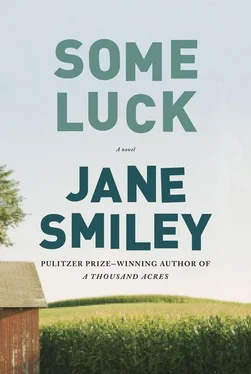Mama kept taking deep breaths and putting her hand over her mouth and looking at him. Finally, she said, “Frankie, did Eloise say what happened to Rolf?”
The windows were all open, and the heat and the dust were blowing through the house. He remembered that later when he thought of this moment, how gaspingly hot it was as Mama said, “Well, Frankie, he hung himself in the barn. He did it late at night, after everyone had gone to bed, so that he was sure he wouldn’t be found until morning. Papa, your grandpa, had to cut him down when he went out to milk in the morning. He just thought … He just thought that Rolf had gotten up early because of the heat. Then the cows were milling around the barn door, so he wondered … but he never imagined …” She coughed, and then did an odd thing, which was she put her head on his knees for a moment. When she sat up, she said, “Lillian and Henry only know that Uncle Rolf died. Joey hasn’t asked, but I’m sure he knows what happened. To you, Frank, I have to say that any life … that this shows me that any life is better than farming. I know he did this because he could see no way out. The drought this year is the worst anyone has ever known around here. The sky gets black and the clouds roll in, and there’s even thunder, and then a drop or two, and nothing more. They had this in Nebraska, and we felt for them, but we felt superior, too — it would never get here — but it’s here. Every day is hotter than the day before. Your dad thinks that the heat turned Rolf’s brain somehow, but it wasn’t that. When Opa left him that farm, I saw it in his face — he was trapped. He never said a word about whether he wanted to farm or didn’t want to farm. Now he’s said his word.” Then she leaned forward. “You have a choice, Frankie.”
But he knew that farming was not a choice for him.
The coffin was closed, a solid block in front of the altar. St. Albans, which was made of brick, had heated up over the summer like an oven, so the windows were all open, and Frankie could hardly hear the priest say the service. The altar boys were sweating in their robes, and several people in the seats had to get up and go out for a drink of water. When Frank and the other five pallbearers lifted the coffin, Frank thought it was a good thing that they only had to carry it out the side door and slide it onto the wagon that would carry it to the cemetery at the edge of Denby. He knew from overhearing Mama and Papa that Granny Mary had told the priest that Rolf had fallen out of the hayloft, and the priest had asked no further questions. All of the Vogels and the Augsbergers were in the cemetery, and Granny Mary was determined that Rolf would lie next to Opa, who was the one person who could raise a laugh out of him, and that was that. The cemetery wasn’t far, and they all walked along behind the wagon. There was the slow clip-clop of the horses’ hooves and the intermittent sound of weeping.
The cemetery, which Frank remembered as grassy, was brown and dusty. Little mounds of dirt had blown up against the western sides of the gravestones. Even the picket fence and the gate, which had always been neatly painted, looked dry and brittle. This cemetery had been so well tended that people around town had picnics there from time to time, just to enjoy the flowers, but now it was a place only of death. Frank couldn’t understand how Granny Mary could bear to see Rolf be taken there, or to leave him behind — but that’s what they did. They used ropes and lowered his coffin into the dry, dry earth, and they tossed handfuls of dust upon it, and said their farewells, and walked away.

AFTER THEY GOT BACK to Chicago, where the weather was just as warm but at least they could go to the lake and sit in the water, Eloise and Julius renewed their argument about the farm. Frank had heard this argument a few times since coming to Chicago, but now it was never-ending. Even Rosa, who had been listening to arguments all of her life, put her head down and then moved farther up the beach. Eloise said, “They have nothing! They aren’t stupid. They can be taught why they have nothing.”
Julius, who was wearing trousers and a shirt even though Frank, Eloise, and Rosa were in swimming costumes, started shaking his head before she even finished, and said, “No, indeed. No, indeed. The peasantry has no political role. They are incapable of it.”
“But conditions have never been this bad before. My brother killed himself!”
“Did you not listen to your mother and your sister, darling? If only he’d gotten married. If only he’d gotten off the farm more. He was always so turned in on himself. You have to get off the farm and see the bigger world! You have to meet some girls! They don’t have even a basic class analysis.”
“Yes, but I’m not saying they understand already, I’m saying that conditions lay the groundwork. Roosevelt’s policies aren’t working — they understand that. My sister even asked me if things are better in the Soviet Union — she heard that they aren’t, but she doesn’t know who to believe anymore.”
“But, darling, do you mean that your father or your brother-in-law would welcome collectivization? Would hand over their land, worthless as they say it is, to the workers? The cows, the sheep, the chickens? The tractor? Walter took me out and led me around the tractor for half an hour. His theory about Rolf was that he knew he would never have a tractor, and that he was being left behind.”
Eloise’s voice rose. “They know what they have has no intrinsic value! It’s a burden! Why not share it?”
Frank finished the wall and moat he was building out of the sand — he had even dribbled water on the wall to smooth the surface, and then inscribed lines into it to represent blocks of stone. Rosa came over and stood in front of her parents, but they were intent, so she put her hand in Frank’s and said, “I want to go down there.” She waved her other hand at the surf, which was swaying easily in and out like water in a bowl.
Frank said, “We can’t swim.”
“Someone could teach us.”
Another protest from Julius clattered on the air. Frank squeezed Rosa’s hand and said, “The lake is pretty flat.”
She led him south along the edge of what he supposed you called surf. Mort and Lew were good swimmers. He thought they might teach him without laughing at him, and if they did laugh, he could just punch them out.
Rosa said, “They’re struggling.”
Rosa, not quite three and a half and using this word, made Frank laugh, but he said, “All moms and dads struggle. Or fight.” Then, “Maybe not about what Eloise and Julius fight about, though.”
“What?”
Frank thought for a moment, then said, “Oh, what to buy, I guess. What to do with naughty children.”
Rosa gazed soberly up at him, then said, “You do what you want.”
He said, “I just do it.”
She nodded.

JOE WAS AT SCHOOL, and the light was better in his room, at least in the afternoon, so Walter took the letter into there to read it. It was from the principal of that school in Chicago where Frankie was going, and it was about something Walter didn’t want to think about — and why should he? He wasn’t going to have a say in the matter, anyway. The matter was college — should Frankie go, and where. Walter was suspicious of college, because it was not something any of the Langdons had ever done, but the Vogels and the Augsbergers seemed to think you couldn’t go wrong if you went — look at Rolf, who had refused to go to St. Ambrose and play the trumpet in the brass band. Rolf hadn’t gone when he had the chance, and then, twenty years later, he goes out and hangs himself in the barn. That brass band had seen the world, and if Rolf had gone to college for a couple of years, Rolf might have been a happier person — that was how the Vogels and the Augsbergers thought. But if you pointed out that Eloise had gone to college and that now she was a Red, they didn’t say a word about it.
Читать дальше














